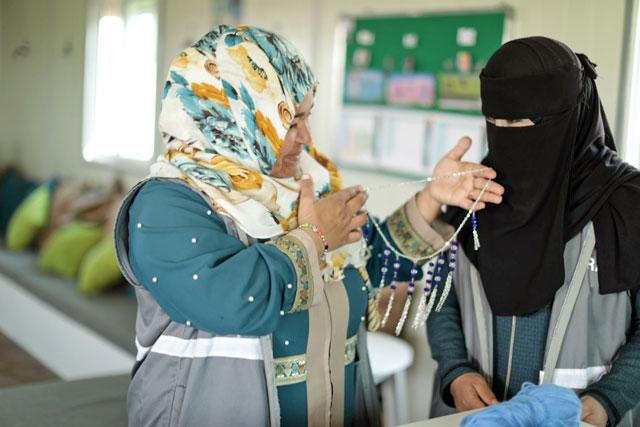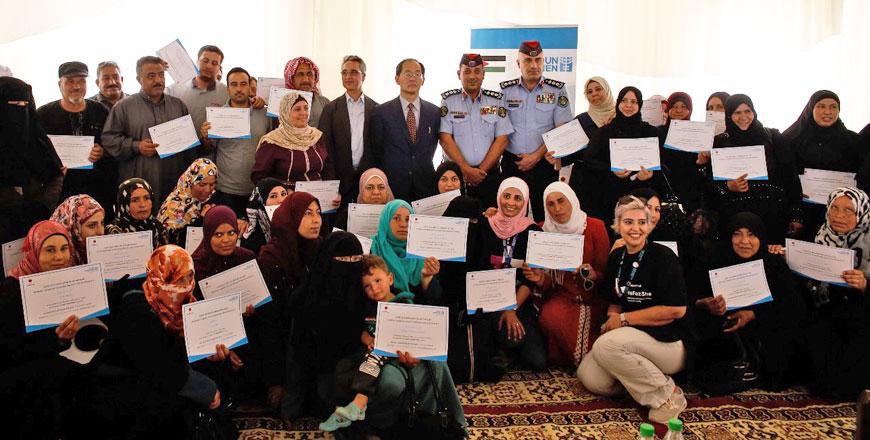You are here
Less than six months after opening, centre fills gap in Azraq Camp
By Johanna Montanari - Aug 01,2019 - Last updated at Aug 01,2019

In this undated photo, beneficiaries are seen at the Women and Girls Safe Space Centre in Azraq Camp (Photo courtesy of the Danish Refugee Council)
AMMAN — For almost half a year, the Women and Girls Safe Space Centre (WGSS) has been operational in Azraq refugee camp. It was opened in March by the Danish Refugee Council (DRC) and The Jordan Times was recently able to talk to the centre’s manager, Reem Alafaghani, about its everyday activities.
“We were expecting the centre to be popular, but the number of attendees has definitely exceeded our expectations,” she told The Jordan Times on Tuesday.
Around 120 women and girls take part in the centre’s activities on a daily basis, according to Alafaghani, who added that beneficiaries have shown improved communication skills and strengthened knowledge on gender roles.
There are activities that aim at protection, like awareness raising sessions on domestic violence and early child marriage and support groups, as well as recreational activities like movies, knitting or sports.
There is also financial skills training and soft vocational training including sewing and tailoring, carpentry, shoe repair, wool knitting and household maintenance. These newly acquired skills can be put to use through Cash for Work (CfW) opportunities, one of the few modalities for residents to earn an income within the camp, Alafaghani said.
According to a DRC report made available to The Jordan Times, humanitarian actors established this incentive-based volunteering (IBV) programme in Azraq camp, some 100km east of Amman, in April 2014 in order to help address the limited livelihoods opportunities and introduce a source of cash into the camp setting.
The programme is coordinated by UNHCR, with applications for IBV rotation managed through CARE International and employment contracts implemented by international NGOs including the DRC.
Applicants are selected for rotations based on their skill level and household vulnerability, according to the report. “All the incentive-based volunteers we need to run our centre, such as guards, cleaners, maintenance staff, trainers and facilitators for our social support programme, are cash-for-workers. Cash-for-work is one of the few available opportunities for people in the Azraq camp to generate income, along with the home-based businesses, of which there are very few and only for the most vulnerable,” Alafaghani explained.
“Work permits are now allowed for refugees living in the camp, but they are not the same as leave permits, so if someone obtains a work permit, that doesn’t mean he or she can leave the camp and work. They still need to apply for a leave permit.”
Candidates applying for grants for home-based businesses must complete a financial literacy and savings training with DRC and submit a business plan, according to Alafaghani.
“The CfW opportunities in Azraq are also very few. There are around 11,000 job seekers in Azraq, and only around 2,000 job opportunities. We have to rotate if we want to give more people opportunities,” Alafaghani said.
According to UNHCR Jordan fact sheet, Azraq is home to 35,752 Syrian refugees, and one in four households are headed by women.
“One of our beneficiaries, a tailoring trainer, invited me to her house a while ago. She was so excited to show me all the new things that she bought: New carpets, nice furniture, a TV, etc.” Alafaghani said.
“I know that for some people it does not seem like a big deal, but for someone who lives in a refugee camp, it is everything. I was very touched by that because I knew that the CfW opportunity enabled her to generate enough money to have a somehow better life.”
Related Articles
AMMAN — Opening a marketplace at the Azraq Refugee Camp is key for honing Syrians’ skills and improving their livelihoods, according to a CA
AMMAN — The Cash-for-Work (CfW) programme has no strong impact on local economic development in Jordan, the Centre for Strategic Studies (CS
AZRAQ CAMP — In 2016, Torfa Aldroboi arrived at Azraq camp with her five children.


















